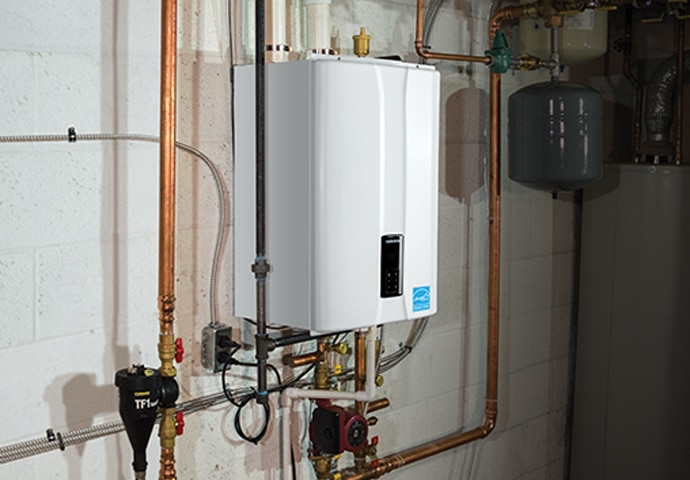When it comes to choosing a water heater for your home, understanding the differences between tankless vs traditional water heater systems is important. A water heater’s primary function is to provide hot water for daily use, such as showering, cleaning dishes, or doing laundry. But the type you choose can impact everything from your energy bill to the comfort of your daily routine.
There are two main types of water heaters available: tankless and traditional (tank-based). Each works in a different way and offers its own set of advantages and drawbacks. This blog aims to walk you through the pros and cons of both systems to help you decide which one is best suited for your household.
Traditional Water Heaters
How They Work
A traditional water heater includes a large tank that stores and heats a set amount of water (usually between 30 to 80 gallons). The water remains heated throughout the day, so it’s ready whenever you need it. When you turn on a hot water tap, water is pulled from the tank. Once the stored water is used, the tank needs time to refill and heat up again.
Pros of Traditional Water Heaters
- Lower Upfront Cost: These models are usually cheaper to purchase and install.
- Simpler Installation: They often don’t require electrical or gas line upgrades, making installation easier and faster.
- Easier and Cheaper to Repair: Parts are more readily available and usually cost less to replace.
- Can Handle Simultaneous Multiple Uses: They provide a steady supply of hot water for multiple taps at the same time until the tank runs out.
Cons of Traditional Water Heaters
- Higher Energy Consumption: They continuously use energy to maintain water temperature, even when not in use.
- Limited Hot Water Supply: Once the tank is empty, you’ll need to wait for it to refill and reheat.
- Larger Space Requirement: These units take up more physical space, often needing a utility room or closet.
- Shorter Lifespan: Typically lasts about 10–15 years.
- Potential for Leaks: Over time, the tank may corrode or crack, causing leaks and water damage.
Tankless Water Heaters
How They Work
When you turn on a hot water tap, cold water passes through a heating element (electric or gas), rapidly warming it.
Pros of Tankless Water Heaters
- Endless Supply of Hot Water: Since it heats water on demand, you won’t run out – ideal for families or long showers.
- Higher Energy Efficiency: No energy is wasted keeping water warm when it’s not being used.
- Lower Operating Costs: Over time, energy savings can add up, especially in homes with frequent hot water usage.
- Space-Saving Design: Compact and wall-mountable, these units save floor space.
- Longer Lifespan: They can last 20 years or more with proper care.
Cons of Tankless Water Heaters
- Higher Upfront Cost: Both the unit and the installation tend to be more expensive.
- More Complex Installation: May require upgrades to gas lines or electrical systems.
- Flow Rate Limitations: Might struggle to supply hot water to multiple outlets at once.
- Potential Cold Water Sandwich: You may experience short bursts of cold water between uses.
- More Frequent Maintenance: Especially in areas with hard water, regular descaling is necessary to keep it running efficiently.
Factors to Consider When Choosing
Household Size and Hot Water Needs
If your household is small with modest water usage, a traditional tank heater may meet your needs without issues. However, for larger families or homes with high water demand (multiple showers, laundry, dishwasher running at once), a tankless system may be better suited to avoid running out of hot water.
Budget
As compared to traditional water heaters, tankless models allow more savings due to their efficiency. Consider your short-term vs long-term budget priorities when choosing between the two.
Space Constraints
Do you have limited room for installation? Tankless water heaters win in this category. Their compact design means they can fit in tight spaces or even on walls.
Energy Efficiency Goals
Traditional heaters lose energy keeping water hot even when not in use, while tankless models use energy only when you need hot water.
Fuel Type Availability
Your choice may also depend on whether you have access to natural gas or rely on electricity. Tankless units, in particular, may require special considerations for energy supply. Make sure to assess what’s available and cost-effective in your area.
Installation Requirements and Costs
Installing a new heater—especially a tankless one—may not be as straightforward as replacing the old unit. You might need to adjust your home’s plumbing or energy lines. It’s wise to get quotes from a certified plumber for both options before making a decision.
Maintenance Requirements
Traditional tanks need to be drained once or twice a year to remove sediment. Maintenance is an important part of extending the lifespan of either system.
Conclusion
Choosing between a tankless vs traditional water heater depends on your home’s specific needs, your budget, and your long-term energy goals. Traditional water heaters are often easier to install and less expensive upfront, but they come with limitations like higher energy use and a limited hot water supply.
Take time to evaluate your household’s hot water usage, available space, and how much you’re willing to spend both now and over time. Both types have their benefits, and with careful planning, you can select a system that keeps your showers warm and your energy bills manageable. Do reach out to the best plumbers at Yolo Plumbing for residential & commercial needs!

Oliver Smith is an experienced blogger at Grammar Globe, Oliver Smith, an expert in English grammar and a master of wit, brings language to life with his playful take on puns. Through his works, he weaves humor into the rules of grammar, making learning fun and engaging for readers of all ages. Discover language with a smile!”







